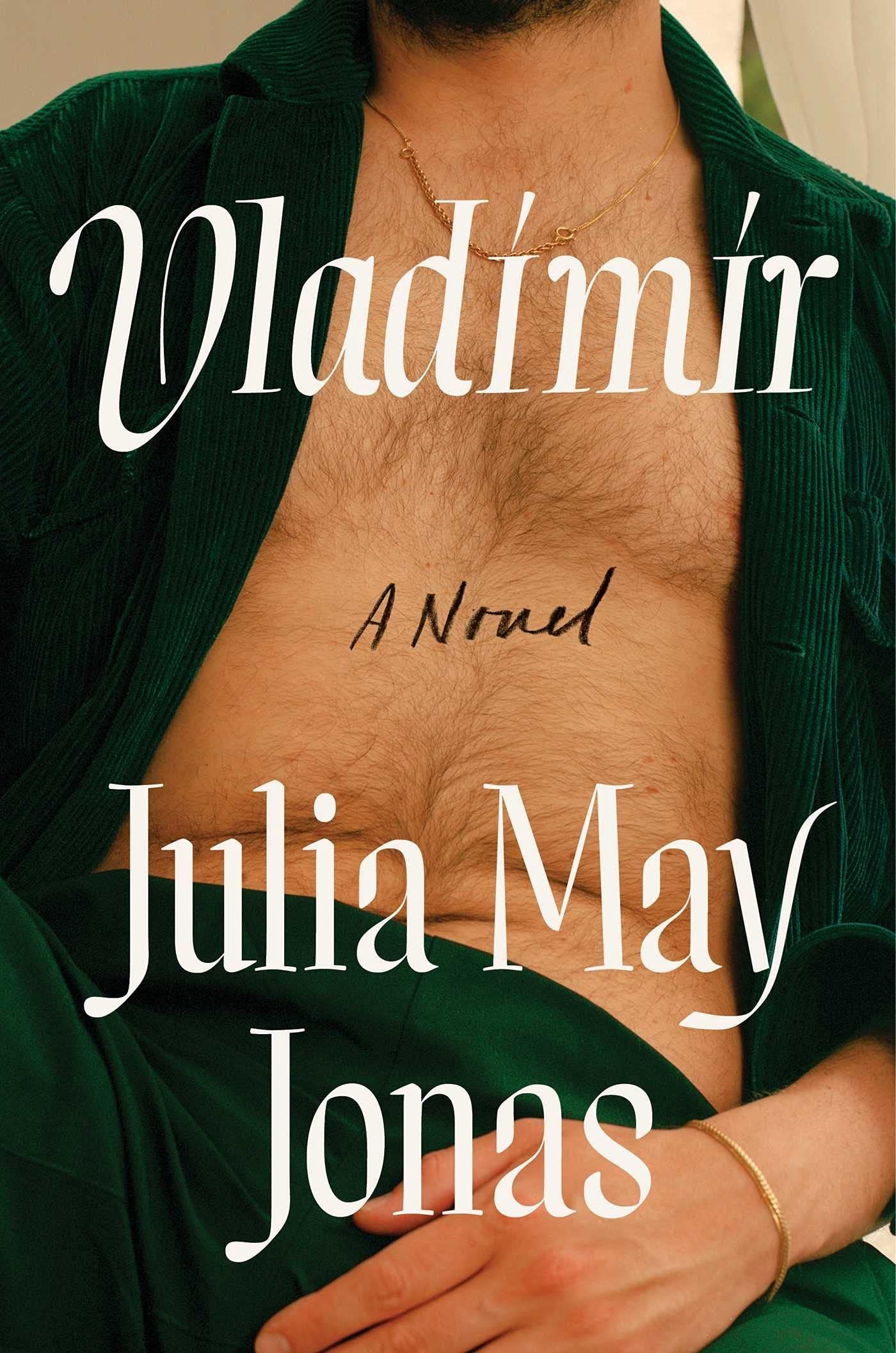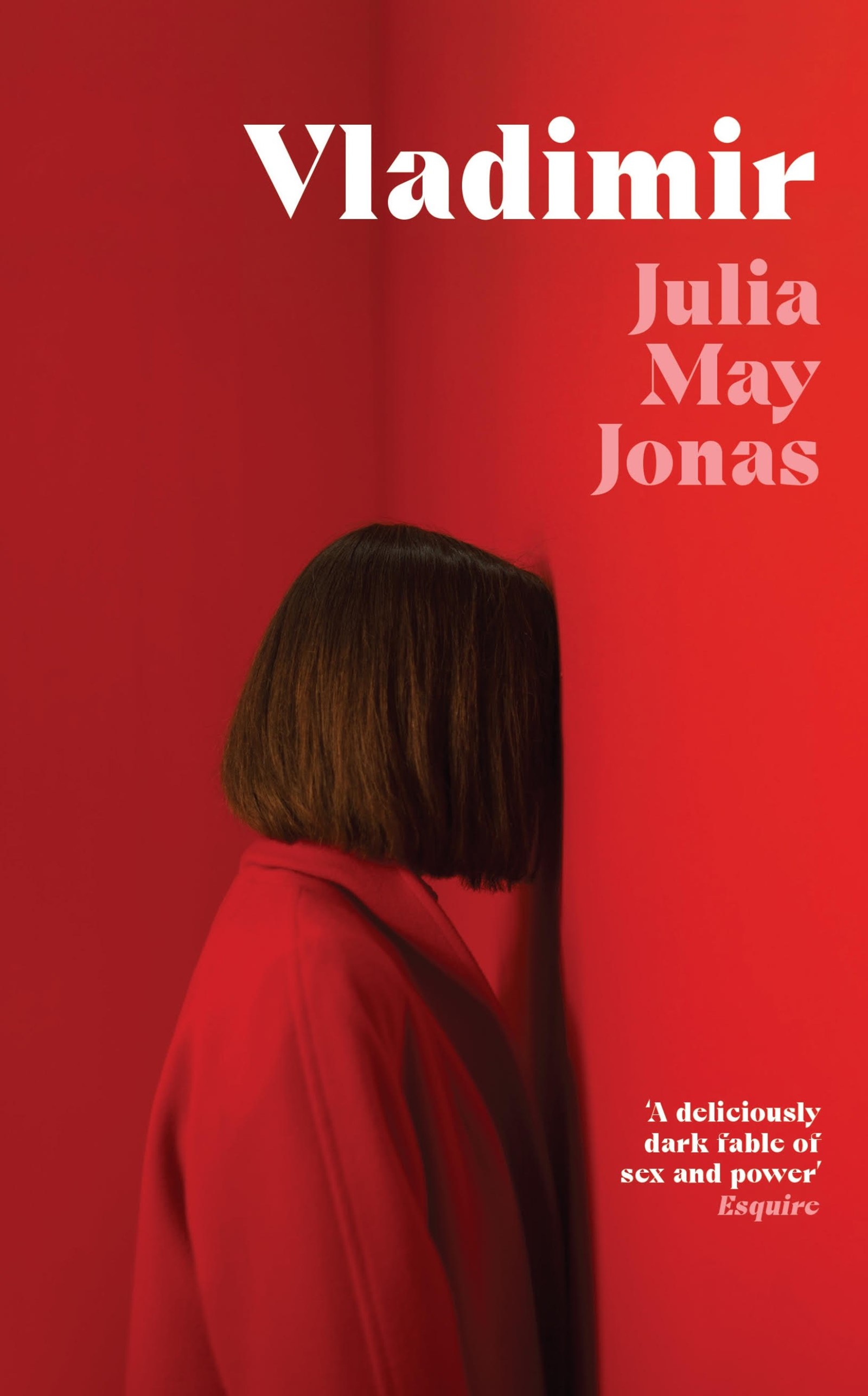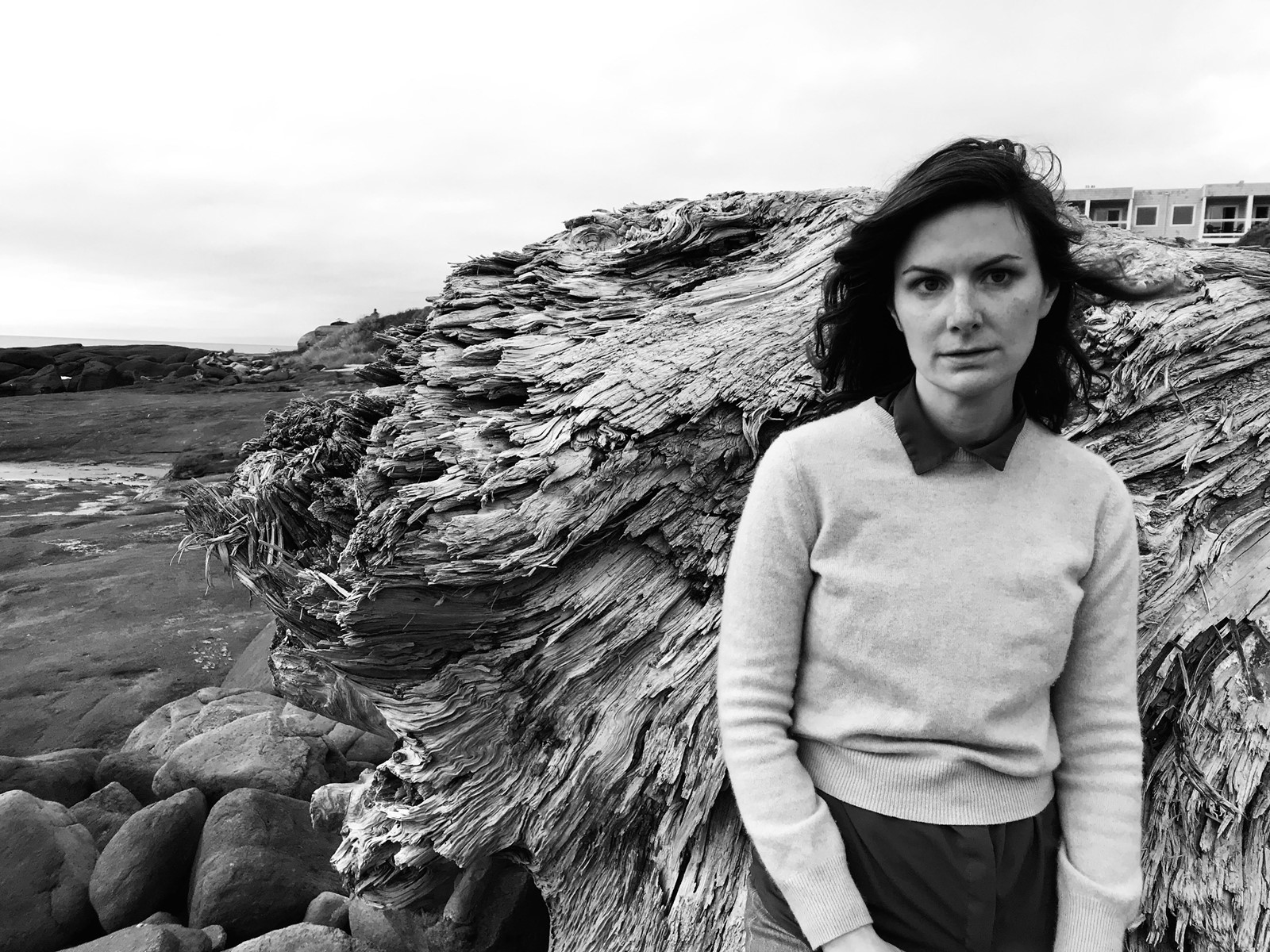Much like the unnamed narrator of her novel, Vladimir, Julia May Jonas has spent a lot of time thinking about desire. At the outset of the pandemic the Brooklyn-based playwright found, like so many, that the only form untouched by Covid was the page and she began what would become her bracingly tart first book. Vladimir was subject to great speculation and praise upon its US release, no doubt thanks to its vividly horny cover, which coaxes the reader with the sight of a man’s soft, pilose-exposed chest.
Set on a campus in upstate New York (Jonas teaches theatre at Skidmore College but don’t read into it), Vladimir follows a respected English professor in the wake of sexual misconduct allegations made against her husband, himself a lecturer and chair of their department. Her loyalties to her partner, her career, and her gender all come into conflict at the same time that their college welcomes Vladimir Vladinski, a comely junior professor. Unsurprisingly, things do not go well.
To smother Vladimir in buzzwords – virtually every review mentions the Me Too movement – is to do it a great disservice, and both the narrator and author are too shrewd to allow Vladimir to become so easily pigeonholed. There is the distinct sense that in less deft hands the book could have fallen victim to the finger on the pulse timeliness for which it’s been praised but Jonas has a dramatist’s gift for understanding what makes her characters tick. It helps that Vladimir is built on a rich literary footing, reminiscent of the sharpest examples of the campus novel, such as Vladimir Nabokov’s Pale Fire or Fleur Jaeggy’s Sweet Days of Discipline.
Here, Jonas speaks about Vladimir’s origin as a “failed play”, why she didn’t write a ‘Me Too novel’, and the problem with female characters not being afforded ambiguity of thought.
Patrick Sproull: I think the US cover is a fantastic cover, I’ve seen it tweeted about a lot, and I believe we need sexier book covers.
Julia May Jonas: Yeah, I really love it as well. I think people have various reactions to it, so I’ll be curious to see the reaction to the UK cover. I think it’s a more generally palatable cover, it’s less divisive.
PS: When I was doing research for this interview, I found that the Me Too movement was mentioned in almost every single headline or review. What are your thoughts on Vladimir being treated as a ‘Me Too novel’?
JMJ: I certainly didn’t start out thinking about that or really thinking about it in general. I think the idea of saying something is a ‘Me Too’ or even a ‘post-Me Too’ novel suggests there’s some form of advocacy in the work. Really, I was interested in exploring the mindset of a person and a character, and the effect of desire on this character. There were all sorts of given circumstances because we all live inside a world of given circumstances and I felt like it would be particularly interesting to have a character where the world was shifting underneath her. I didn’t specifically write to anything like that. I know that Me Too is not mentioned in the novel, for example.
“I feel like we have a certain resistance to ambiguity of thought, particularly in women – I think potentially in anyone who we’re not used to seeing have ambiguity of thought” – Julia May Jonas
PS: Were you quite intentional about omitting that and making sure it wasn’t mentioned?
JMJ: To be honest, it didn’t even come up and I think partially because the narrator herself is someone who’s trying to work through things through a very individualistic point of view. I think that for her even to admit that something was part of a movement like Me Too would start to become reductive, so she wants to figure it out rightly or wrongly. I don’t even want to make a judgment about her because it really was about thinking about this mindset of someone who’s trying to work through that thing. Her acknowledging Me Too felt uncharacteristic to her.
PS: Something the book does so well is the way the narrator explicitly rejects moral absolutism, and I was very grateful to read a contemporary campus novel that didn’t include the words ‘cancel culture’. I’m curious about whether the current discourse around that type of moral absolutism in art played on your mind during the writing process.
JMJ: I hesitate to say it’s the message of the book but I do feel like the book is engaging with ideas of morality in art and how we can separate what people do and what people think from what the work is in itself, and representation and how we separate that from our experience as readers. I was thinking about this recently because there’s been some reaction about the narrator and saying that the book advocates for certain viewpoints, which I don’t feel like it does.
I feel like we have a certain resistance to ambiguity of thought, particularly in women – I think potentially in anyone who we’re not used to seeing have ambiguity of thought. With characters in Updike and characters in Roth, we didn’t then view the books as advocating for their behaviour, for example. I think it’s harder for women. I was recently reflecting that Iris Murdoch, for the most part, her characters are men, and my guess is that she might have done that to avoid the complications that come with being a woman writing about a woman and then having that immediately ascribed to what you think as an author.

PS: Was that intention to explore moral ambiguity in a female character the initial drive to write Vladimir?
JMJ: I think the main starting point of the book was a woman thinking about her relationship to desire. I had written this play that had all sorts of characters talking about their relationship to desire, how they talked about desire, how they accounted for desire and their ownership about desire. One character inside of that was this college professor who was showing around a younger male professor and she was obviously very horny for him. That was the seed for the book, I think, it was somebody accounting for their own sense of wanting.
PS: Where did Vladimir himself come from? There’s been so much discussion over the narrator, but he’s the title character.
JMJ: He was a combination of fantasies and projections about various straight male writers in their 40s who I have all sorts of thoughts and opinions about. Writers who, in general, I feel are probably good, decent people, and I think that it’s unfair for me to have all these fantasies about them in some way. I think that certainly happens when anybody has any level of notoriety, you start to personalise them according to your own cosmology, and so Vladimir came about through me thinking about that kind of character and what he would be like coming to this small town. The nice thing is that I’m writing from the narrator’s viewpoint, so he really is a cypher for her to project everything onto.
“I had written this play that had all sorts of characters talking about their relationship to desire, how they talked about desire, how they accounted for desire and their ownership about desire ... That was the seed for the book, I think, it was somebody accounting for their own sense of wanting” – Julia May Jonas
PS: Young people are rendered so authentically in Vladimir – the narrator alternates between contempt and admiration throughout. What elements of your experience as a teacher did you bring to the book?
JMJ: If I do take anything from my experience as a teacher, it is that kind of floating perception the narrator has because sometimes I’m very aware that I’m 20 years older and have much more life experience than my students. Sometimes I’m in awe of them and I’m so amazed at how much more self-possessed I feel they are than when I was at college. If anything, it was that vacillating perception that I was trying to get at because if we haven’t had enough coffee, a student can be the most annoying person in the world.
The one thing that I find different is that my students are more comfortable with adults than I was. The relationship in college is less one of gods descending upon me to teach me things and that relationship now feels more of an exchange, which I think is positive.
PS: You’ve previously described writing Vladimir as like writing a monologue. Was that how you initially drafted the book?
It was the way I could keep connecting to the voice. When I would start, I would think about it as a monologue this character was giving. When I mentioned that I meant that, that was kind of the way I would think of it, and it would be the helpful thing for me to return to when I felt like I was trying to stay inside the voice. In a play, it would never actually work for her to tell you as many things as she does so there were liberties, but it was a touchpoint that was helpful.

PS: I’m interested in the literary inspirations behind Vladimir. It reminded me of Vladimir Nabokov’s Pale Fire in some ways and with the shared name, I wonder if he was an inspiration?
JMJ: Sure. There were many Nabokov novels that I drew from. The one I thought of most directly was Laughter in the Dark, but I also thought of Pale Fire, I thought of Lolita, and I thought of Pnin. I was playfully interacting with all of his work and then I got to a point where I realised that I was, to an extent, writing what you might call a Gothic novel or what I think of as a disaster novel where a character runs themself into the ground. I started to pull on forms like that – like Jane Eyre or Rebecca or Madame Bovary or Cousin Bette.
I mentioned her before, but I feel like Iris Murdoch does something so well that I’m always fascinated by where she has a novel that starts in psychological realism and events start to happen that become increasingly fantastical. I’ve always been excited by that because I feel like she’s challenging the reader to ask if they can accept where this character is going and ask if they can accept what this character is doing. So, her books – The Sea, The Sea, A Severed Head, The Philosopher’s Pupil in a way – were all books I was thinking about.
PS: Would you ever revisit these characters?
JMJ: A legal team asked me this and I said no, but sometimes I regret that statement of no. I’m sure I could take it back.
PS: You’re welcome to here if you like.
JMJ: I might. But I think I want some space before I do so.
PS: Are you working on another book?
JMJ: I am. I’m very superstitious about talking about what I’m writing. I didn’t even tell anyone I was writing a novel until I was finished because I knew if I did, I would kill it. Vladimir is a very contained story and the story I’m working on has a lot more sprawl, and that’s what I’m currently interested in thinking about.
Vladimir by Julia May Jonas is published by Picador, and is out now.
